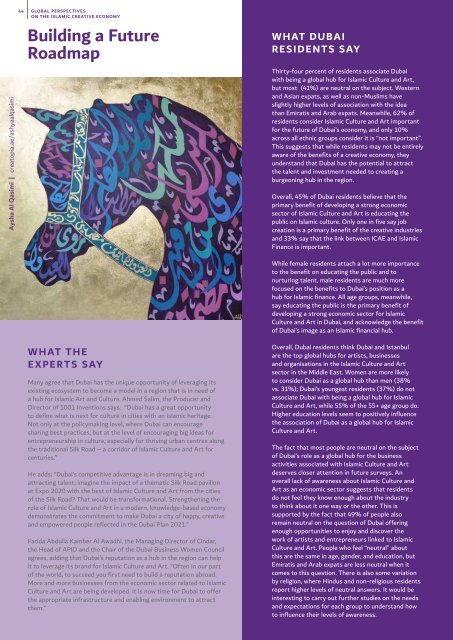9 Aug_ICAE_Book_with PT Notes
You also want an ePaper? Increase the reach of your titles
YUMPU automatically turns print PDFs into web optimized ePapers that Google loves.
44 GLOBAL PERSPECTIVES<br />
ON THE ISLAMIC CREATIVE ECONOMY<br />
Building a Future<br />
Roadmap<br />
WHAT DUBAI<br />
RESIDENTS SAY<br />
Aysha Al Qasimi | creatopia.ae/ashyaalqasimi<br />
Thirty-four percent of residents associate Dubai<br />
<strong>with</strong> being a global hub for Islamic Culture and Art,<br />
but most (41%) are neutral on the subject. Western<br />
and Asian expats, as well as non-Muslims have<br />
slightly higher levels of association <strong>with</strong> the idea<br />
than Emiratis and Arab expats. Meanwhile, 62% of<br />
residents consider Islamic Culture and Art important<br />
for the future of Dubai’s economy, and only 10%<br />
across all ethnic groups consider it is “not important”.<br />
This suggests that while residents may not be entirely<br />
aware of the benefits of a creative economy, they<br />
understand that Dubai has the potential to attract<br />
the talent and investment needed to creating a<br />
burgeoning hub in the region.<br />
Overall, 45% of Dubai residents believe that the<br />
primary benefit of developing a strong economic<br />
sector of Islamic Culture and Art is educating the<br />
public on Islamic culture. Only one in five say job<br />
creation is a primary benefit of the creative industries<br />
and 33% say that the link between <strong>ICAE</strong> and Islamic<br />
Finance is important.<br />
While female residents attach a lot more importance<br />
to the benefit on educating the public and to<br />
nurturing talent, male residents are much more<br />
focused on the benefits to Dubai’s position as a<br />
hub for Islamic finance. All age groups, meanwhile,<br />
say educating the public is the primary benefit of<br />
developing a strong economic sector for Islamic<br />
Culture and Art in Dubai, and acknowledge the benefit<br />
of Dubai’s image as an Islamic financial hub.<br />
WHAT THE<br />
EXPERTS SAY<br />
Many agree that Dubai has the unique opportunity of leveraging its<br />
existing ecosystem to become a model in a region that is in need of<br />
a hub for Islamic Art and Culture. Ahmed Salim, the Producer and<br />
Director of 1001 Inventions says: “Dubai has a great opportunity<br />
to define what is next for culture in cities <strong>with</strong> an Islamic heritage.<br />
Not only at the policymaking level, where Dubai can encourage<br />
sharing best practices, but at the level of encouraging big ideas for<br />
entrepreneurship in culture, especially for thriving urban centres along<br />
the traditional Silk Road – a corridor of Islamic Culture and Art for<br />
centuries.”<br />
He adds: “Dubai’s competitive advantage is in dreaming big and<br />
attracting talent; imagine the impact of a thematic Silk Road pavilion<br />
at Expo 2020 <strong>with</strong> the best of Islamic Culture and Art from the cities<br />
of the Silk Road? That would be transformational. Strengthening the<br />
role of Islamic Culture and Art in a modern, knowledge-based economy<br />
demonstrates the commitment to make Dubai a city of happy, creative<br />
and empowered people reflected in the Dubai Plan 2021.”<br />
Farida Abdulla Kamber Al Awadhi, the Managing Director of Cindar,<br />
the Head of APID and the Chair of the Dubai Business Women Council<br />
agrees, adding that Dubai’s reputation as a hub in the region can help<br />
it to leverage its brand for Islamic Culture and Art. “Often in our part<br />
of the world, to succeed you first need to build a reputation abroad.<br />
More and more businesses from the economic sector related to Islamic<br />
Culture and Art are being developed. It is now time for Dubai to offer<br />
the appropriate infrastructure and enabling environment to attract<br />
them.”<br />
Overall, Dubai residents think Dubai and Istanbul<br />
are the top global hubs for artists, businesses<br />
and organisations in the Islamic Culture and Art<br />
sector in the Middle East. Women are more likely<br />
to consider Dubai as a global hub than men (38%<br />
vs. 31%); Dubai’s youngest residents (37%) do not<br />
associate Dubai <strong>with</strong> being a global hub for Islamic<br />
Culture and Art, while 55% of the 55+ age group do.<br />
Higher education levels seem to positively influence<br />
the association of Dubai as a global hub for Islamic<br />
Culture and Art.<br />
The fact that most people are neutral on the subject<br />
of Dubai’s role as a global hub for the business<br />
activities associated <strong>with</strong> Islamic Culture and Art<br />
deserves closer attention in future surveys. An<br />
overall lack of awareness about Islamic Culture and<br />
Art as an economic sector suggests that residents<br />
do not feel they know enough about the industry<br />
to think about it one way or the other. This is<br />
supported by the fact that 49% of people also<br />
remain neutral on the question of Dubai offering<br />
enough opportunities to enjoy and discover the<br />
work of artists and entrepreneurs linked to Islamic<br />
Culture and Art. People who feel “neutral” about<br />
this are the same in age, gender, and education, but<br />
Emiratis and Arab expats are less neutral when it<br />
comes to this question. There is also some variation<br />
by religion, where Hindus and non-religious residents<br />
report higher levels of neutral answers. It would be<br />
interesting to carry out further studies on the needs<br />
and expectations for each group to understand how<br />
to influence their levels of awareness.


